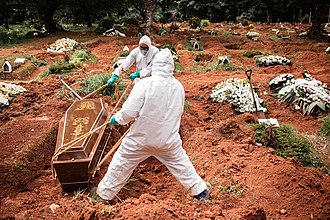COVID-19 pandemic in Brazil
Overview of the COVID-19 pandemic in Brazil
The COVID-19 pandemic in Brazil is part of the worldwide pandemic of coronavirus disease 2019 (COVID-19) caused by severe acute respiratory syndrome coronavirus 2 (SARS-CoV-2). The virus was confirmed to have spread to Brazil on 25 February 2020, when a man from São Paulo tested positive for the virus. Since then, the pandemic has had a profound impact on the country, affecting public health, the economy, and society at large.
Timeline[edit]
Initial Outbreak[edit]
The first confirmed case of COVID-19 in Brazil was reported on 25 February 2020. The patient was a 61-year-old man who had returned from a trip to Italy, which was experiencing a significant outbreak at the time. Following this, the virus spread rapidly across the country.
Spread and Response[edit]

By March 2020, COVID-19 cases were reported in all 26 states and the Federal District. The Brazilian government declared a national public health emergency and implemented various measures to curb the spread of the virus, including social distancing, quarantine, and the closure of non-essential businesses.
Healthcare System Impact[edit]
The pandemic placed immense pressure on Brazil's healthcare system. Hospitals, particularly in major cities like São Paulo and Rio de Janeiro, faced shortages of beds, ventilators, and personal protective equipment. Healthcare workers were overwhelmed by the surge in patients.
Government Measures[edit]
Federal and State Responses[edit]
The response to the pandemic in Brazil was marked by a lack of coordination between federal and state governments. While some state governors implemented strict lockdowns and mask mandates, the federal government, led by President Jair Bolsonaro, often downplayed the severity of the virus and opposed lockdown measures.
Vaccination Campaign[edit]

Brazil launched its COVID-19 vaccination campaign in January 2021. The campaign initially faced challenges due to vaccine shortages and logistical issues. However, by mid-2021, vaccination rates increased significantly, contributing to a decline in new cases and deaths.
Social and Economic Impact[edit]
Economic Consequences[edit]
The pandemic severely affected Brazil's economy, leading to a recession. Unemployment rates soared, and many businesses, particularly in the service sector, faced closures. The government introduced emergency financial aid to support low-income families and stimulate the economy.
Social Effects[edit]
The pandemic exacerbated existing social inequalities in Brazil. Vulnerable populations, including those living in favelas, faced higher risks of infection due to crowded living conditions and limited access to healthcare.
Public Health Measures[edit]
Testing and Contact Tracing[edit]

Testing and contact tracing were critical components of Brazil's public health response. However, the country faced challenges in scaling up testing capacity, particularly in the early stages of the pandemic.
Mask Distribution[edit]

Efforts were made to distribute masks and other protective equipment to the public, especially in densely populated areas.
Mortality and Memorials[edit]
Death Toll[edit]
Brazil experienced one of the highest COVID-19 death tolls in the world. The pandemic led to a significant increase in burials and cremations, overwhelming cemeteries in major cities.

Memorials and Remembrance[edit]
Communities across Brazil held memorials to honor those who lost their lives to COVID-19. These events served as a reminder of the pandemic's profound impact on the nation.
Related Pages[edit]
Ad. Transform your life with W8MD's Budget GLP-1 injections from $75


W8MD offers a medical weight loss program to lose weight in Philadelphia. Our physician-supervised medical weight loss provides:
- Weight loss injections in NYC (generic and brand names):
- Zepbound / Mounjaro, Wegovy / Ozempic, Saxenda
- Most insurances accepted or discounted self-pay rates. We will obtain insurance prior authorizations if needed.
- Generic GLP1 weight loss injections from $75 for the starting dose.
- Also offer prescription weight loss medications including Phentermine, Qsymia, Diethylpropion, Contrave etc.
NYC weight loss doctor appointmentsNYC weight loss doctor appointments
Start your NYC weight loss journey today at our NYC medical weight loss and Philadelphia medical weight loss clinics.
- Call 718-946-5500 to lose weight in NYC or for medical weight loss in Philadelphia 215-676-2334.
- Tags:NYC medical weight loss, Philadelphia lose weight Zepbound NYC, Budget GLP1 weight loss injections, Wegovy Philadelphia, Wegovy NYC, Philadelphia medical weight loss, Brookly weight loss and Wegovy NYC
|
WikiMD's Wellness Encyclopedia |
| Let Food Be Thy Medicine Medicine Thy Food - Hippocrates |
Medical Disclaimer: WikiMD is not a substitute for professional medical advice. The information on WikiMD is provided as an information resource only, may be incorrect, outdated or misleading, and is not to be used or relied on for any diagnostic or treatment purposes. Please consult your health care provider before making any healthcare decisions or for guidance about a specific medical condition. WikiMD expressly disclaims responsibility, and shall have no liability, for any damages, loss, injury, or liability whatsoever suffered as a result of your reliance on the information contained in this site. By visiting this site you agree to the foregoing terms and conditions, which may from time to time be changed or supplemented by WikiMD. If you do not agree to the foregoing terms and conditions, you should not enter or use this site. See full disclaimer.
Credits:Most images are courtesy of Wikimedia commons, and templates, categories Wikipedia, licensed under CC BY SA or similar.
Translate this page: - East Asian
中文,
日本,
한국어,
South Asian
हिन्दी,
தமிழ்,
తెలుగు,
Urdu,
ಕನ್ನಡ,
Southeast Asian
Indonesian,
Vietnamese,
Thai,
မြန်မာဘာသာ,
বাংলা
European
español,
Deutsch,
français,
Greek,
português do Brasil,
polski,
română,
русский,
Nederlands,
norsk,
svenska,
suomi,
Italian
Middle Eastern & African
عربى,
Turkish,
Persian,
Hebrew,
Afrikaans,
isiZulu,
Kiswahili,
Other
Bulgarian,
Hungarian,
Czech,
Swedish,
മലയാളം,
मराठी,
ਪੰਜਾਬੀ,
ગુજરાતી,
Portuguese,
Ukrainian